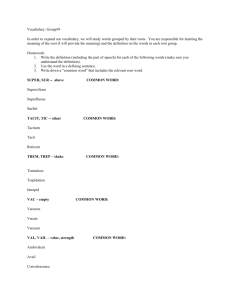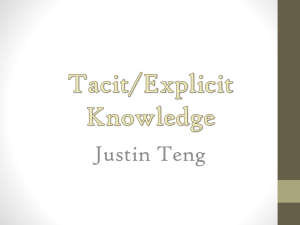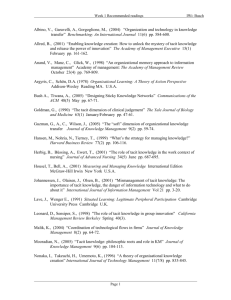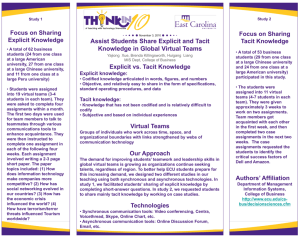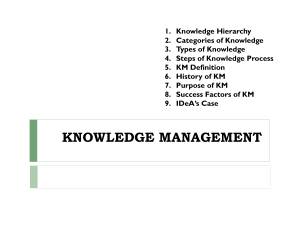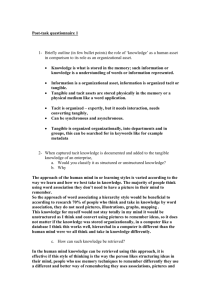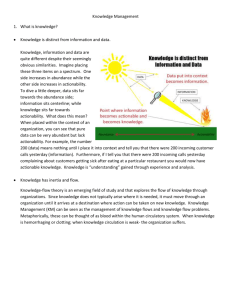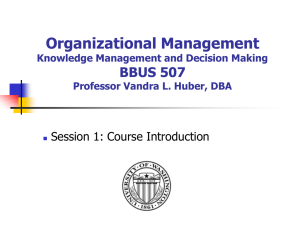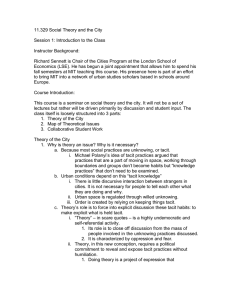Knowledge management 18
advertisement
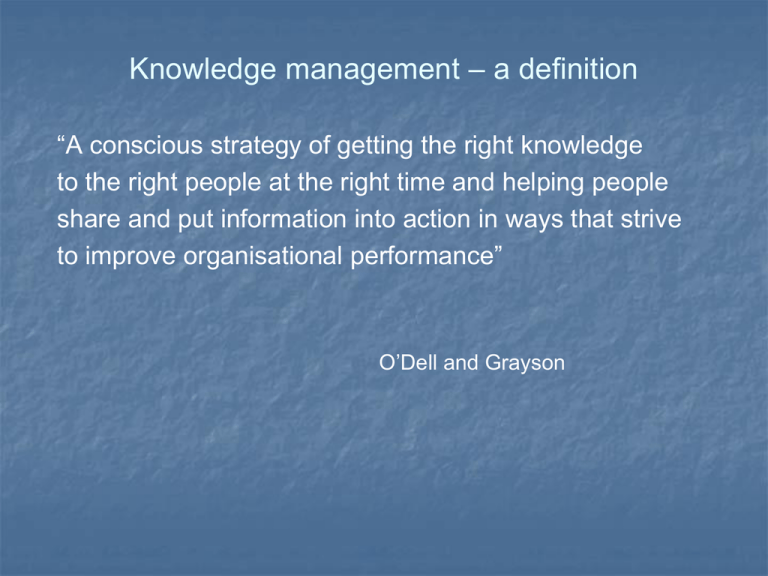
Knowledge management – a definition “A conscious strategy of getting the right knowledge to the right people at the right time and helping people share and put information into action in ways that strive to improve organisational performance” O’Dell and Grayson Knowledge management – an explanation “Knowledge management means putting in place and maintaining, policies, tools and venues that foster the growth and dissemination of knowledge” Source: Morey et al Two types of knowledge Tacit We know some of what we know Explicit We know more than we can tell Source: Polanyi Two types of tacit knowledge Cognitive Mental models, beliefs, values, viewpoints Technical Concrete know how and skills Source: Hsu and Shen Three types of knowledge management capital Human all an organisation’s employee’s skills, know-how, memories and such Structural all patents, rules, copyrights, procedures and documentation that belong to your organisation Social all the trust-based relationships that enable knowledge sharing Source: Morey et al Four essentials of knowledge management Capturing the most valuable information and knowledge Validating to ensure relevance and accuracy Accessing what is needed when it is needed Scaling – managing ever increasing volumes Source: Ruddy Four factors in managing knowledge Culture Old Pros Archives Processes Is there a will for all this? Humans with invaluable tacit knowledge Stored explicit knowledge Ways to capture store and share knowledge Source: Wellman Four fundamentals of knowledge management Knowledge Knowledge Knowledge Knowledge is abundant not scarce works best through sharing not hoarding resides in people – the most valuable resource derives from learning and experience Source: Waddock Four stages in the knowledge management cycle Knowledge creation Knowledge adoption Knowledge distribution Knowledge review and revision Source: Gonesh Five core issues around knowledge management Visibility Manipulability Detached involvement Ambivalent manipulation Accepted responsibility Source: Thomas et al Five essentials of knowledge management Knowledge management does not move in a straight line Knowledge grows organically Knowledge growth is chaotic, messy and slow Data is merely an aggregation of facts and observations Knowledge is the ability to do something worthwhile with data Source: Morey et al Five stages in real knowledge management Identification Extraction Storage Distribution Access Source: Andrew Gibbons Six outcomes of a knowledge audit Identification of glut or lack of information and knowledge Lack of awareness of information held elsewhere Inability to keep abreast of relevant information Significant wheel reinvention Common use of out-of-date information Not knowing sources of expertise Source: Grossman Six barriers to knowledge management No time/low priority Lack of awareness that knowledge sharing is part of their job No sense of value ‘Knowledge is power’ Perception that knowledge sharing is hard Absence of corporate, institutional support Source: Frank Leistner Seven components of wisdom The wisdom of: duality resonance ecology aggregation magnamanity stratification enlightenment Nine classes of data for knowledge management Five primary classes Acquisition Selection Generation Assimilation Emission Four secondary classes Leadership Co-ordination Control Measurement Source: Jones The key to knowledge management “If only we knew what we know” Jerry Junkins “The most valuable asset of a 21st century Institution, whatever business or non-business, will be its knowledge workers and their productivity” Peter Drucker
